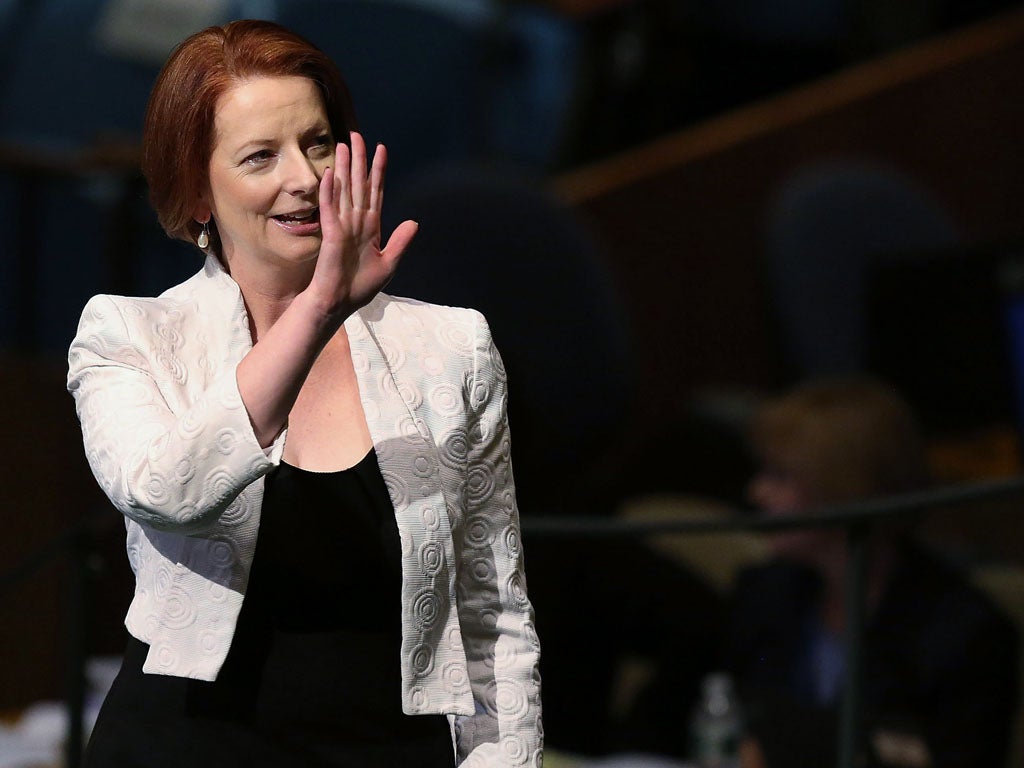The Independent's journalism is supported by our readers. When you purchase through links on our site, we may earn commission.
Catcalls, cuties, blow up dolls... Australian PM Julia Gillard was right about a woman's place in politics
Long before that speech went viral last week, women we being objectified in politics. Good for those who fight this misogyny; but it shouldn't be up to them alone


Last week, the video of Australian Prime Minister Julia Gillard responding to countless inappropriate sexist attacks during her time in office went viral.
While thousands voiced their approval, many criticised Gillard’s speech, labelling it a political ploy or accusing her of overreacting. One blog published by the Telegraph suggested that she had in fact “gratuitously” betrayed her own “emotional sensitivity” in the speech and needed to “man up”. An Australian politician claimed she had “demeaned every woman in this parliament” by “playing the gender card”, concluding “if you can’t stand the heat, get out of the kitchen.”
But to suggest that women in power should simply submit to such high levels of misogynistic abuse, founded entirely upon their gender and yet wielded as a weapon against their policies, is simply baffling. To imply, when a woman in power has been repeatedly lambasted with sexist slurs and misogynistic labels like “witch” and “bitch”, that it is she, in standing up to such bullying, who undermines the strength of women in politics, is absurd.
The vital importance of Gillard’s speech lay in the message it sent to young girls around the globe who are forming their ideas about the adult world and deciding where they might like to fit into it.
From the treatment of Angela Merkel, these girls have learned that even if Forbes magazine labels you the most powerful woman in the world, it will still see fit to run an article on your “frumpy power suits” and “silly pageboy haircut”. From Hillary Clinton’s experience they have learned that women in politics will be questioned, not on their political beliefs, but on their favourite designers; that they will be arbitrarily lambasted both for being too feminine and not feminine enough. From Sarah Palin’s Vice Presidential campaign they have learned that no matter what your ideas on the environment or the economy, voters will sexually objectify you when you are immortalized as a blow-up doll. And from the experience of French minister Cecile Duflot, they have learned not to dare wear a dress if they want their political point to be heard above the catcalls from fellow MPs.
Here in the UK, girls have learned that MPs’ breasts are fair game for public debate; that a newspaper can bully a female politician by naming a Page 3 picture after her; that when two female politicians disagree, the result is not a debate but a “catfight” – and that they are not MPs, but “blondes”. From our own Prime Minister, they have learned that a female politician who dares to show passion in the House of Commons will be reprimanded by being told to “calm down, dear”. From articles on Cameron’s Cuties and Blair’s Babes to Hollande’s Honeys, girls are learning that cabinet reshuffles lead to new male members being grilled on their past voting records while the women are described as “glamorous political beauties” and reprimanded for their high heels.
The trickle-down effect of these messages is clear to see in many experiences recorded on the Everyday Sexism Project in the past six months alone. Many young women wrote to describe being dissuaded or belittled in their political ambitions, or even mocked for having them in the first place. One explained:
“I took A-level politics … I had worked hard to prepare for a debate in which I was the only female in my team. While providing a counter-argument my teacher stopped me and asked the males in my team whether they were going to let a woman do all the talking.”
Another described frequently hearing the comment: "Oh, you're doing a politics course? You must be very smart, things like that are really hard for girls!"
Another post read: “I'm very into my politics, but upon entering debates regularly get told I need to 'cheer up', or to 'stop taking life so seriously'. My male friends never receive these comments.”
One even reported an incident at school when she was “Told I should be a "pornstar" and that I look like a "prostitute" when talking about what we wanted to do when older, after I said that I wanted to get involved in politics.”
One schoolgirl said: “Went on a trip to the Houses of Parliament as part of our Government & Political Studies A Level… We were given a tour… The guide said "There is a book shop over there, there are recipe books for the girls".”
And these experiences weren’t only reported by students:
One woman told us: “I was at a political event, being interviewed, the journalist said "women that look like you aren't interested in politics".”
Another wrote “I tweet political views and I'm called "stupid," "whore," "uneducated" despite advanced degrees and long career in politics.”
Even as I write this article, MP Stella Creasy tweets: “How charming. Twitter Troll just asked for my colleague to ‘get her jugs’ out in home office question time.”
In the light of these attitudes towards women in politics, Gillard wasn’t just right to make the speech she did. It was utterly vital for her to send an alternative message to young women: that sexism in politics shouldn’t be tolerated, that they have the right to aspire to any career they choose, and that misogyny should not, and will not, be allowed to stand in their way.
Join our commenting forum
Join thought-provoking conversations, follow other Independent readers and see their replies
Comments
Bookmark popover
Removed from bookmarks